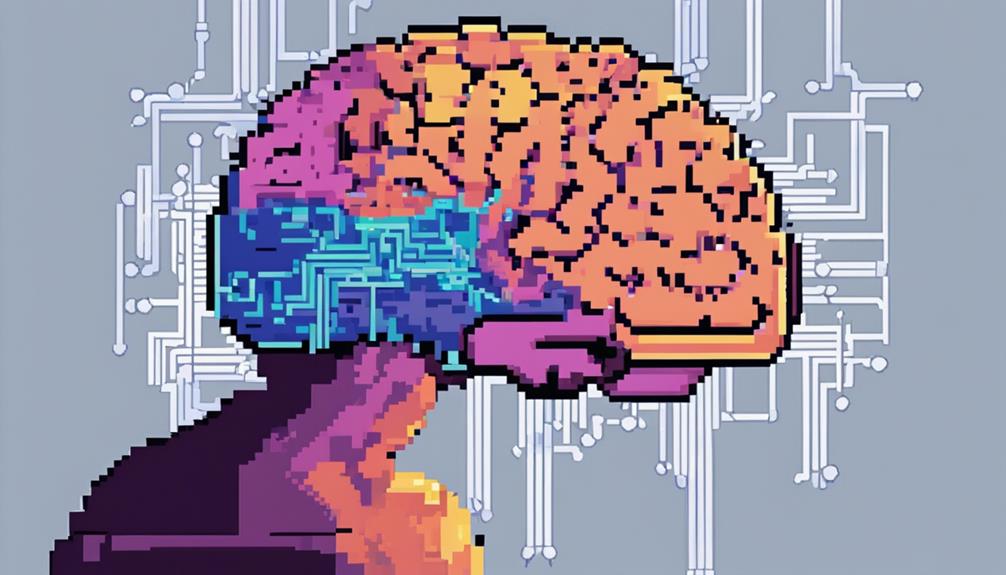Explore the potential of your mind to enhance self-improvement in psychology. Understand how mental practices influence your well-being. Discover the power of positive visualization and the placebo effect in shaping your experiences and health. Embrace mindfulness for stress reduction, immune system strengthening, and pain management. Enhance athletic performance through visualization and mental resilience techniques. Foster personal growth with a growth mindset, achieving goals and increasing overall well-being. Gain valuable insights and boost creativity through community connections. Strengthen self-control and enhance cognitive function through mindfulness training. Uncover the impact your mind has on your experiences and well-being.
Key Takeaways
- Harnessing the power of the mind for self-improvement.
- Using mindfulness techniques to enhance well-being.
- Improving performance through mental practices.
- Cultivating personal growth with a growth mindset.
- Enhancing cognitive function and self-control through training.
The Science of Mind Influence
Understanding the science of mind influence sheds light on the powerful connection between mental practices and their impact on our physical and emotional well-being. The concept of mind power, particularly the subconscious mind, plays a significant role in shaping our experiences and overall health. Through mindfulness training, individuals learn to harness the potential of their minds to bring about positive changes in their lives.
Research has shown that practices like meditation and positive visualization have the ability to influence not just our thoughts but also our physical bodies. This influence can be profound, with studies demonstrating the effectiveness of mental techniques in promoting healing and well-being. The placebo effect, for instance, highlights how beliefs can directly impact our physical state, leading to remarkable outcomes such as pain reduction and accelerated healing processes.
Furthermore, mindfulness-based stress reduction and guided imagery have been integrated into medical treatments, showing substantial benefits in enhancing the healing journey. Athletes also utilize visualization techniques to boost their performance, with scientific evidence supporting the advantages of mental rehearsal in optimizing their skills and outcomes.
Healing Through Mindfulness

Healing through mindfulness involves harnessing the power of mental practices to enhance well-being and promote faster recovery. By incorporating techniques like mindfulness and visualization, individuals can actively participate in their healing process.
Here are some key facts to take into account:
- Mind-Body Connection: Mindfulness-based stress reduction has been proven to reduce stress levels and strengthen the immune system, showcasing the profound impact of the mind on the body's healing abilities.
- Guided Imagery: Utilizing guided imagery in medical treatments has been shown to expedite recovery and enhance overall outcomes for patients, highlighting the role of mental practices in promoting healing.
- Pain Management: Techniques like Mindfulness-Based Stress Reduction (MBSR) play a significant role in managing pain and improving overall well-being, demonstrating the effectiveness of mindfulness in alleviating physical discomfort.
- Positive Visualization: Incorporating positive visualization and mindfulness practices can't only enhance pain management but also facilitate the healing process, emphasizing the importance of mental well-being in recovery.
Mind in Athletic Performance

Utilizing visualization techniques, athletes enhance their performance through mental rehearsal and building confidence, supported by scientific evidence. By mentally picturing themselves executing a flawless jump, making an accurate shot, or crossing the finish line first, athletes can improve their actual physical performance. This form of mental rehearsal not only boosts confidence but also reduces anxiety, leading to more focused and precise movements during competition.
Athletes who participate in extreme sports often showcase remarkable mental resilience when facing challenging physical obstacles such as fear, pain, and exhaustion. Through a positive mindset and the use of visualization, these athletes can push past their limits and achieve extraordinary feats.
The combination of mental practices and a confident outlook plays an essential role in enhancing athletic performance and aiding in overcoming obstacles that may arise during training or competition. Confidence gained from mental preparation translates into improved physical abilities and a greater chance of success in the sporting arena.
Personal Growth and Mindset

Embracing a growth mindset can lead to numerous benefits in your personal development journey.
By adopting mindful self-improvement techniques, you can enhance your mental tenacity and resilience.
Cultivating a determined mindset will empower you to achieve extraordinary growth and success in various aspects of your life.
Growth Mindset Benefits
Developing a growth mindset enhances personal growth and mindset by fostering resilience and perseverance in the face of challenges. Embracing this mindset can have a significant impact on your life. Here are some benefits:
- Resilience: A growth mindset helps you bounce back from setbacks and view failures as opportunities for learning.
- Motivation: Individuals with a growth mindset are driven to improve and achieve their goals.
- Well-being: Research indicates that a growth mindset can lead to increased overall well-being and happiness.
- Academic Performance: Cultivating a growth mindset can also improve academic performance by encouraging a belief in one's ability to develop skills and intelligence.
Mindful Self-Improvement Techniques
Engage in mindful self-improvement techniques to cultivate personal growth and enhance your mindset effectively.
Mindfulness training, including practices like meditation and positive affirmations, can greatly impact your health and well-being. Studies have shown that incorporating mindfulness into your daily routine can lead to improved mental resilience and overall well-being.
By developing a positive mindset through mindfulness, you can better navigate challenges and obstacles that come your way. These techniques aren't only beneficial for your mental health but also play an essential role in achieving your goals and finding fulfillment in life.
In today's fast-paced world dominated by social media, taking the time to prioritize mindful self-improvement is crucial for maintaining a healthy balance and nurturing a positive outlook on life.
Embrace these practices to realize your full potential and foster a sense of inner peace and contentment.
Insights From the Community

You can gain valuable insights from the community that can positively influence your creative process and subconscious mind.
By connecting with others and sharing experiences, you may discover new ways to enhance your intuition and boost your creativity.
These shared insights can lead to personal growth and development in various aspects of your life.
Community Insights Impact
By incorporating community insights, psychologists can adapt techniques to better address the unique needs and preferences of individuals seeking self-improvement in psychology. This collaborative approach allows for a more tailored and effective self-improvement experience.
Here are some ways community insights impact self-improvement techniques:
- Enhanced Customization: Tailoring techniques based on community feedback can notably improve their effectiveness and relevance to individuals.
- Increased Engagement: By incorporating insights from the community, psychologists can create more engaging and relatable self-improvement programs.
- Better Results: Community insights provide valuable information on what works best for different individuals, leading to more substantial and long-lasting improvements.
- Continuous Improvement: Regularly gathering feedback from the community allows psychologists to refine and optimize self-improvement strategies continuously.
Through this collaborative process, self-improvement techniques can evolve and improve quite a lot, ensuring that they meet the diverse needs of individuals seeking personal growth and development.
Influencing Creative Subconscious
Leveraging insights from the community reveals the profound impact of influencing the creative subconscious for personal growth and development. Game designers, for instance, harness the power of the subconscious mind to generate innovative ideas, resulting in heightened creativity and originality. Similarly, writers draw inspiration from their subconscious to enrich storytelling and fuel imagination, creating compelling narratives. Neuroscience techniques offer a pathway to boost confidence levels through subconscious programming, empowering individuals to overcome self-doubt and achieve their goals.
| Benefits | Methods |
|---|---|
| Enhanced creativity and originality in design | Leveraging the subconscious mind for innovative ideas |
| Improved confidence levels through subconscious programming | Utilizing neuroscience techniques for boosting self-assurance |
| Enriched storytelling and imagination in writing | Tapping into the subconscious mind for creative inspiration |
Enhancing Intuition for Creativity
Enhancing intuition for creativity has been a key focus among community members seeking to reveal unique insights and ideas. By tapping into your subconscious mind, you can reveal a wealth of creativity and innovation.
Here are four ways to enhance your intuition for creativity:
- Game Design: Learn to harness your subconscious for fresh and innovative ideas in your game design projects.
- Neuroscience Techniques: Utilize neuroscience methods to boost confidence and access your intuitive creativity.
- Writing Practices: Access your creative potential by intentionally connecting with your subconscious mind through targeted writing exercises.
- Personal Growth: Developing your intuition can lead to significant personal growth, fostering creativity and uncovering new perspectives.
Tailoring guided imagery to suit your preferences can further optimize your creative process, aligning with subconscious cues to enhance your overall creative output.
Neural Networks and Attention

Understanding how neural networks function in relation to attention is essential in the field of psychology.
The brain's attention system comprises orienting and executive networks. The orienting network directs focus towards external stimuli, while the executive network manages conflicts and executes goals.
The anterior cingulate gyrus, a brain region, aids the executive network during attention tasks. In early life, the orienting network regulates attention, shifting to the executive network during childhood.
One way to assess the executive attention network is through the Attention Network Test. This test not only evaluates executive attention function but also shows correlations with measures of behavioral self-control.
Significance of Self-Control

Shifting focus from neural networks and attention, the importance of self-control lies in its predictive power over various aspects of an individual's life. Here are some key points to keep you engaged:
- Early Indicator: Self-control as early as age 4 can forecast future health, wealth, social relations, and crime rates.
- Enhancing Success: Training the executive attention network function may boost self-control, leading to greater success in life.
- Measuring Tool: The Attention Network Test evaluates executive attention network function by analyzing reaction times.
- Therapeutic Potential: Improving self-control through training could be beneficial in addressing addiction and various mental health issues.
Considering these facts, it's evident that self-control plays a vital role in shaping our lives and influencing our overall well-being. By understanding its importance and exploring methods to enhance it, individuals can potentially improve their outcomes in various areas of life.
Training the Mind

Training your mind through attention and mindfulness techniques can lead to improved executive function and self-control, ultimately enhancing your overall well-being and success in life. Attention training works by strengthening your mind's ability to focus on executive tasks, which in turn improves your self-control and decision-making skills. Studies have demonstrated that attention training methods can result in enhanced performance in tasks that require sustained focus and cognitive flexibility.
On the other hand, mindfulness training, such as mindfulness meditation, can boost executive attention and even induce changes in critical areas of the brain responsible for cognitive functions. Brain scans have shown alterations in the anterior cingulate cortex following mindfulness training, suggesting potential benefits for mental well-being. By training your mind through these techniques, you not only enhance your cognitive abilities but also pave the way for better self-regulation, which can be beneficial in managing addiction and mental health issues.
Mind's Impact on Experience

Increased focus on a task can inadvertently lead to more mind wandering, impacting productivity and overall experience. This phenomenon highlights the intricate relationship between the mind's tendencies and our daily experiences.
Here are some key points to keep in mind:
- Anxiety-induced inactivity: Mind wandering can trigger anxiety, leading to inactivity that fuels procrastination.
- Negative mental tendencies: Mind wandering often involves negative thoughts, which can further exacerbate procrastination behaviors.
- Benefits of mindfulness training: Engaging in mindfulness practices can help mitigate the effects of mind wandering, enhancing focus and productivity.
- Setting subgoals for success: Breaking down larger goals into smaller, manageable subgoals can aid in maintaining commitment and motivation, even when mind wandering occurs.
Understanding how the mind influences our experiences is essential for personal growth and self-improvement. By recognizing these dynamics, individuals can proactively work towards enhancing their focus and overall well-being.
Frequently Asked Questions
What Is the Mind Over Matter Theory in Psychology?
The mind over matter theory in psychology emphasizes how mental processes influence physical outcomes. Your thoughts, emotions, and behaviors shape your well-being. Understanding this theory is essential for self-improvement and personal growth, highlighting mind-body interconnectedness.
What Is the Mind Over Matter Principle?
You can shape your reality with a positive mindset and visualization techniques. Your thoughts and emotions directly impact your health and performance. Harness the power of your mind to improve your well-being and achieve your goals.
What Is an Example of Mind Over Matter?
When you push beyond limits, embracing mental strength and determination, you embody mind over matter. Athletes visualize success, meditation enhances well-being, and the placebo effect proves beliefs shape outcomes. Your mind wields immense power.
How Can I Improve My Mind Over Matter?
So, you wanna improve your mind over matter, huh? Well, try engaging in mindfulness practices like meditation, challenging negative thoughts with gratitude journaling, practicing mindful eating, spending time in nature, and using breath work techniques.
How Can Psychology Help in Achieving Next Level Self-Improvement Goals?
Psychology can be a valuable tool in reaching your next level self-improvement goals. By understanding the underlying behaviors and thought patterns, individuals can develop strategies for overcoming obstacles and making lasting changes. With the help of a trained psychologist, you can gain insight and develop a plan to achieve your next level selfimprovement goals.
Conclusion
You've harnessed the power of your mind, shaping your reality like a skilled sculptor.
Plunge deep into the ocean of self-improvement, where your thoughts become waves of change.
Embrace mindfulness, harness your focus, and watch as your potential unfolds before you.
Your mind is a treasure trove waiting to be uncovered – immerse yourself and let its brilliance shine.









